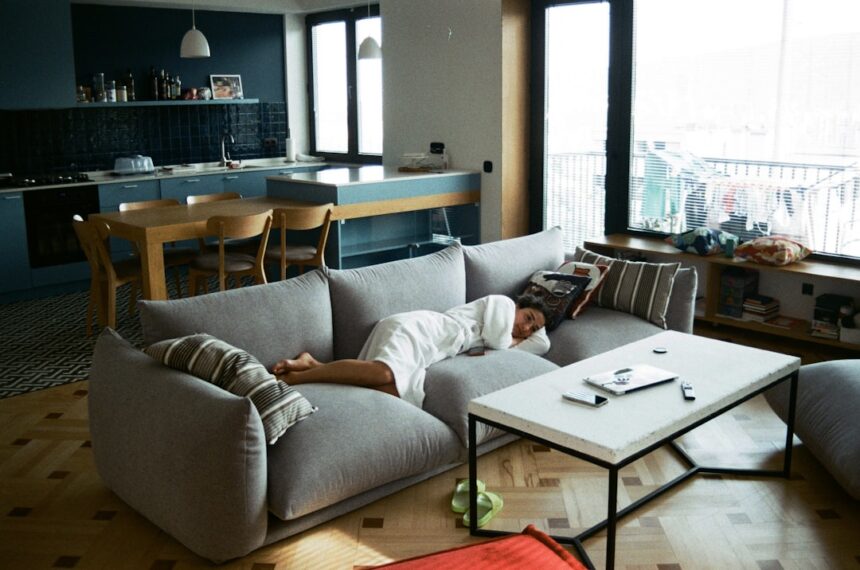Social jet lag is a phenomenon that many people experience, often without realizing it. It occurs when there is a significant discrepancy between your internal biological clock and the social obligations that dictate your daily schedule. For instance, you might find yourself waking up early during the week for work or school, only to sleep in on weekends.
This misalignment can lead to feelings of fatigue, irritability, and a general sense of being out of sync with your body’s natural rhythms. You may notice that your energy levels fluctuate dramatically throughout the week, leaving you feeling drained by the time Friday rolls around. To truly grasp the concept of social jet lag, consider how your body responds to these shifts.
Your circadian rhythm, which regulates sleep-wake cycles, thrives on consistency.
You might find it challenging to concentrate during the day or feel an overwhelming urge to nap.
Understanding social jet lag is the first step toward reclaiming your sleep and improving your overall well-being.
Key Takeaways
- Social jet lag occurs when our sleep schedule on weekends differs significantly from our weekday schedule
- Social jet lag can disrupt our circadian rhythm and lead to sleep disturbances and fatigue
- Establishing a consistent sleep schedule, even on weekends, can help reduce social jet lag
- Creating a relaxing bedtime routine can signal to the body that it’s time to wind down and prepare for sleep
- Limiting screen time before bed can help reduce the impact of blue light on our circadian rhythm and improve sleep quality
Identifying the Impact on Sleep
Recognizing how social jet lag affects your sleep is crucial for making necessary adjustments. You may notice that you struggle to fall asleep at night, tossing and turning as your mind races with thoughts about the day ahead. This difficulty can stem from the stress of trying to adapt to a schedule that doesn’t align with your natural sleep patterns.
As a result, you might wake up feeling groggy and unrefreshed, which can set a negative tone for your entire day. Moreover, the impact of social jet lag extends beyond just feeling tired. It can lead to more serious health issues over time, such as increased risk for anxiety and depression.
By identifying these impacts, you can take proactive steps to mitigate them and foster a healthier relationship with sleep.
Establishing a Consistent Sleep Schedule

One of the most effective ways to combat social jet lag is by establishing a consistent sleep schedule. This means going to bed and waking up at the same time every day, even on weekends. You might think that sleeping in on Saturday will help you catch up on lost rest, but this can actually exacerbate the problem.
By sticking to a regular schedule, you help regulate your body’s internal clock, making it easier to fall asleep and wake up feeling refreshed. To create this consistency, start by determining how many hours of sleep you need each night. Most adults require between seven to nine hours of sleep for optimal functioning.
Once you have this figure in mind, set a bedtime that allows you to wake up at the same time each morning. You may need to make gradual adjustments if your current schedule is significantly different. By committing to this routine, you’ll likely notice improvements in your mood, energy levels, and overall health.
Creating a Relaxing Bedtime Routine
| Activity | Time |
|---|---|
| Dimming lights | 30 minutes before bedtime |
| Reading a book | 15-20 minutes |
| Listening to calming music | 10-15 minutes |
| Deep breathing exercises | 5-10 minutes |
In addition to establishing a consistent sleep schedule, creating a relaxing bedtime routine can significantly enhance your ability to fall asleep. This routine signals to your body that it’s time to wind down and prepare for rest. You might consider incorporating calming activities such as reading a book, practicing gentle yoga, or engaging in meditation.
These activities can help quiet your mind and ease any tension built up throughout the day. As you develop your bedtime routine, pay attention to what works best for you. You may find that certain activities help you relax more than others.
For instance, if you enjoy listening to soothing music or taking a warm bath before bed, make these practices a regular part of your routine. The key is to create an environment that promotes relaxation and signals to your body that it’s time for sleep.
Limiting Screen Time Before Bed
In today’s digital age, limiting screen time before bed is essential for improving sleep quality. The blue light emitted by phones, tablets, and computers can interfere with your body’s production of melatonin, the hormone responsible for regulating sleep. If you find yourself scrolling through social media or binge-watching shows late into the night, you may be inadvertently sabotaging your sleep efforts.
To combat this issue, consider setting a digital curfew for yourself. Aim to turn off all screens at least an hour before bedtime. Instead of reaching for your phone or tablet, engage in activities that promote relaxation and prepare your mind for sleep.
This could include reading a physical book, journaling about your day, or practicing mindfulness exercises. By reducing screen time before bed, you’ll likely find it easier to drift off into a restful slumber.
Avoiding Caffeine and Alcohol Before Bed

Your dietary choices can also play a significant role in your sleep quality. Consuming caffeine or alcohol close to bedtime can disrupt your ability to fall asleep and stay asleep throughout the night. Caffeine is a stimulant that can keep you alert and awake long after you’ve consumed it, while alcohol may initially make you feel drowsy but can lead to fragmented sleep later in the night.
To improve your sleep hygiene, aim to avoid caffeine in the afternoon and evening hours. Instead of reaching for that afternoon coffee or energy drink, consider opting for herbal tea or water. Similarly, if you enjoy unwinding with a drink in the evening, try to limit alcohol consumption or choose non-alcoholic alternatives.
By being mindful of what you consume before bed, you’ll set yourself up for a more restful night’s sleep.
Creating a Comfortable Sleep Environment
Your sleep environment plays a crucial role in determining how well you rest each night. A comfortable bedroom can significantly enhance your ability to fall asleep and stay asleep throughout the night. Start by evaluating your mattress and pillows; they should provide adequate support and comfort for your preferred sleeping position.
If you wake up with aches or pains, it may be time to invest in new bedding. Additionally, consider factors such as room temperature, lighting, and noise levels. A cool room is generally more conducive to sleep; aim for a temperature between 60-67 degrees Fahrenheit for optimal comfort.
You might also want to invest in blackout curtains or an eye mask to block out light and earplugs or a white noise machine to minimize disruptive sounds. By creating an inviting sleep environment tailored to your preferences, you’ll increase your chances of enjoying restorative rest.
Incorporating Regular Exercise into Your Routine
Regular exercise is another vital component of healthy sleep habits. Engaging in physical activity during the day can help regulate your circadian rhythm and promote better sleep quality at night. You may find that even moderate exercise—such as walking or cycling—can have significant benefits for your overall well-being and sleep patterns.
However, timing is essential when it comes to exercise and sleep. While working out earlier in the day can boost energy levels and improve mood, exercising too close to bedtime may have the opposite effect by increasing adrenaline levels and making it harder for you to wind down. Aim to finish any vigorous workouts at least three hours before bedtime so that your body has time to relax before sleep.
Managing Stress and Anxiety
Stress and anxiety are common culprits when it comes to poor sleep quality. If you find yourself lying awake at night with racing thoughts or worries about the day ahead, it’s essential to develop strategies for managing these feelings effectively. Consider incorporating mindfulness practices into your daily routine; techniques such as deep breathing exercises or meditation can help calm an anxious mind.
Additionally, journaling can be an effective way to process thoughts and emotions before bed. By writing down any worries or tasks that are weighing on your mind, you create space for relaxation and signal to yourself that it’s time to let go of those concerns for the night. Finding healthy outlets for stress management will not only improve your sleep but also enhance your overall mental well-being.
Seeking Professional Help if Needed
If you’ve tried various strategies but still struggle with sleep issues, it may be time to seek professional help. Sleep disorders such as insomnia or sleep apnea can significantly impact your quality of life and require specialized treatment. A healthcare provider can help assess your situation and recommend appropriate interventions tailored to your needs.
Don’t hesitate to reach out for support if you feel overwhelmed by persistent sleep challenges. A professional can provide valuable insights into underlying issues contributing to poor sleep quality and guide you toward effective solutions that promote healthier habits.
Staying Consistent with Healthy Sleep Habits
Ultimately, consistency is key when it comes to improving your sleep quality and combating social jet lag. By committing to healthy sleep habits—such as maintaining a regular schedule, creating a relaxing bedtime routine, limiting screen time before bed, avoiding stimulants like caffeine and alcohol, and managing stress—you’ll set yourself up for success in achieving restorative rest. Remember that change takes time; be patient with yourself as you work toward establishing these habits in your daily life.
Over time, you’ll likely notice significant improvements in how well you sleep and how energized you feel during the day. By prioritizing healthy sleep practices, you’re investing in your overall health and well-being—something that will benefit every aspect of your life.
Social jet lag, a term used to describe the misalignment between an individual’s biological clock and their social schedule, has been gaining attention for its potential impact on mental health and overall well-being. This phenomenon often results from the discrepancy between our natural sleep patterns and the demands of modern life, such as work or school schedules. For those interested in exploring more about the psychological aspects of sleep and its effects, an insightful article can be found on Unplugged Psych’s website. You can read more about related topics by visiting their homepage.
WATCH THIS! Is This Hidden ADHD Sign Quietly Wrecking Your Sleep and Draining Your Energy?
FAQs
What is social jet lag?
Social jet lag is a term used to describe the misalignment between an individual’s biological clock and their social schedule. It occurs when a person’s natural sleep-wake patterns are disrupted by social obligations, such as work, school, or social activities.
What causes social jet lag?
Social jet lag can be caused by a variety of factors, including irregular work schedules, shift work, late-night social activities, and excessive use of electronic devices before bedtime. These factors can disrupt the body’s natural circadian rhythm, leading to sleep disturbances and fatigue.
What are the effects of social jet lag?
The effects of social jet lag can include fatigue, difficulty concentrating, irritability, and an increased risk of accidents or errors. Over time, chronic social jet lag can also contribute to long-term health issues such as obesity, diabetes, and cardiovascular problems.
How can social jet lag be minimized?
Minimizing social jet lag involves establishing a consistent sleep schedule, creating a sleep-friendly environment, and practicing good sleep hygiene. This may include avoiding caffeine and alcohol before bedtime, limiting screen time, and creating a relaxing bedtime routine. Additionally, maintaining a healthy lifestyle with regular exercise and a balanced diet can help regulate the body’s internal clock.




